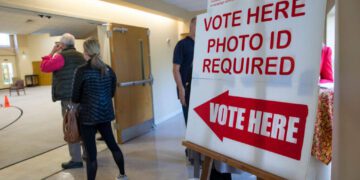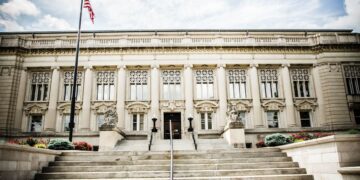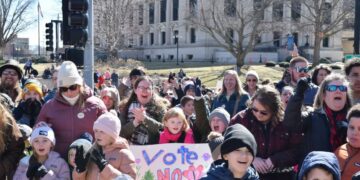Sign located on a Pilsen neighborhood church in Chicago
WEST CHICAGO – Immigration could be a key issue in Chicago's western suburbs next November as Republicans fight to retake control of the U.S. House. But a letter in response to President Trump's executive order concerning refugee placement has opened the discussion in Illinois' purple DuPage County.
Earlier this week, President Trump told a group of young conservatives at a conference in West Palm Beach, "We believe our country should be a sanctuary for law-abiding Americans, not for criminal aliens. The open borders agenda of the radical left causes profound harm to poor, working-class Americans."
The debate erupting in DuPage County Illinois has come down to determining the difference between the terms "refugees" and "immigrants." If they're one and the same, Republican DuPage County Board Chairman Dan Cronin is giving conservatives the impression he is shrugging off President Trump's views on protecting law-abiding Americans.
Last month, Chairman Cronin consented to "initial refugee resettlement in DuPage County per the terms of Trump's Executive Order 13888." The order says "Close cooperation with State and local governments ensures that refugees are resettled in communities that are eager and equipped to support their successful integration into American society and the labor force."
The president's order calls for local jurisdictions to notify the federal government as to whether their area is willing and able to handle refugees needing a location wherein to settle. Chairman Cronin said DuPage County is open to refugees.
Not only did Chairman Cronin welcome more refugees to the county, so do a growing number of the area's evangelical pastors.
According to the Evangelical Immigration Table, nine senior or lead pastors of Chicago area evangelical churches – three in far west suburban West Chicago and two in nearby Naperville – are opening their arms to refugees and calling for comprehensive immigration reform:
- Rob Bugh, Senior Pastor, Wheaton Bible Church (West Chicago, IL)
- Jackson Crum, Lead Pastor, Park Community Church (Chicago, IL)
- Dave Ferguson, Lead Pastor, Community Christian Church (Naperville, IL)
- Juan Guillén, Pastor, Willow Creek Casa de Luz, Willow Creek Community Church, (South Barrington, IL)
- Wilfredo de Jesus, Senior Pastor, New Life Covenant Church (Chicago, IL)
- Mark Jobe, Lead Pastor, New Life Community Church (Chicago, IL)
- Dave McDowell, Senior Pastor, Community Fellowship Church (West Chicago, IL)
- Hanibal Rodriguez, Lead Pastor, Iglesia del Pueblo (West Chicago, IL)
- Randall Ross, Senior Pastor, Calvary Church (Naperville, IL)
And there the difference between "refugees" and "immigrants" gets murky.
On the Evangelical Immigration Table's website, the group continues to call for an "immigration solution" – moving away from just "refugees" to protecting "immigrants." The group says:
"As evangelical Christian leaders, we call for a bipartisan solution on immigration that:
- Respects the God-given dignity of every person
- Protects the unity of the immediate family
- Respects the rule of law
- Guarantees secure national borders
- Ensures fairness to taxpayers
- Establishes a path toward legal status and/or citizenship for those who qualify and who wish to become permanent residents.
"Our national immigration laws have created a moral, economic and political crisis in America. Initiatives to remedy this crisis have led to polarization and name calling in which opponents have misrepresented each other’s positions as open borders and amnesty versus deportations of millions," the group says. "This false choice has led to an unacceptable political stalemate at the federal level at a tragic human cost. We urge our nation’s leaders to work together with the American people to pass immigration reform that embodies these key principles and that will make our nation proud."
Then in early December, many more Illinois evangelical pastors affiliated with the Evangelical Immigration Table and World Relief signed onto a letter pleading with Governor Pritzker to respond positively to President Trump's executive order concerning "refugees"
In the letter sent December 9th, the leaders wrote refugees are lawfully present in the US and help fill the job vacancies so prevalent in Illinois. The pastors argued:
Refugees resettled by the U.S. State Department are lawfully present in the U.S. from the moment of their arrival. Each one undergoes a thorough vetting process abroad before being approved for resettlement; in fact, the vetting process for refugees is the most thorough screening our federal government has for any category of immigrant or visitor coming to the U.S.. The vetting process is remarkably successful: since the Refugee Act of 1980, no refugee resettled to the U.S. has taken a single American life in an act of terrorism. We can be secure and compassionate in welcoming refugees. Refugees also play an important role in Illinois’ economy.
With a remarkably low statewide unemployment rate of just 4.0%, labor shortages pose a significant threat to ongoing economic growth. Refugees are employment authorized from the day they arrive and are eager to embrace the dignity of work, a right that was generally denied them in the countries from which they came. Various studies have found that, in the long-term, refugees contribute significantly more in tax revenues than they cost taxpayers in the form of initial resettlement assistance or public benefits. Refugees also make significant contributions to local economies in that they have a particularly high rate of entrepreneurship, higher than other immigrants and the nativeborn population.
The other side of the issue
Conservatives in Chicago's western suburbs see Chairman Cronin's response to the President's executive order as a push for more immigrants, despite the term "refugees" being used throughout. For overburdened taxpayers, the terminology doesn't matter.
"Whenever they bring in the influx of new immigrants, existing taxpayers end up supporting them in many ways," one conservative told Illinois Review. "It’s very easy for these organizations, who like to call themselves compassionate, to spend other people’s money to implement their 'compassion'."
Americans are sympathetic to refugees facing persecution, but more and more of those crossing the border are claiming persecution as the reason they are coming into America. In other words, they are claiming asylum.
In July 2019, the New York Times wrote that America's asylum system, "long a part of American law, was meant to give immigrants a legal opportunity to live in the United States only when they could demonstrate that they would face persecution, torture or death if they returned to their home countries."
But the president referred to those claims as "loopholes." “The asylum rules and laws are so bad that our Border Patrol people, who are so incredible, aren’t allowed to do their jobs,” the president said.
"Mr. Trump argues that migrants are gaming the system by falsely claiming asylum and then skipping out on their court hearings," the NYTimes said. "In fact, the government’s own statistics show that most asylum seekers show up for their court hearings, especially if they are represented by a lawyer."
And then there's the affiliation and motive behind groups like "Evangelical Immigration Table." Who's behind it?
In 2013, Chicago area independent journalist Julie Roys looked into allegations that the Evangelical Immigration Table was financially affiliated with the Left-leaning National Immigration Forum.
"Over the past three years," Roys wrote, "the Forum received more than a third of its funding – more than 4.2 million dollars – from Soros' Open Society and the Ford Foundation."
For some, "refugees" and "immigrants" are distinctly different. For others, they're the same.
The question remains unanswered for now.







